Understanding the needs and challenges of small and medium enterprises in Africa is critical to building an ecosystem that will help them to succeed, speakers at yesterday’s session on Innovative SME Financing for Africa’s resilient recovery: A gender and youth lens.
This economic segment, which also includes micro businesses, is a critical underpinning of the continent’s economic structure, making up the majority of businesses in most countries.
The agility and innovative approaches of young people is what the continent needs in its efforts to recover from the pandemic and build inclusive economies, said Karima Bounemra Ben Soltane, Director of the Institute of Economic Planning and Development.
Women also need to be properly empowered to play a leading role in wealth creation in Africa, but challenges they face undermine their ability to contribute.
Various speakers called for surveys for policy makers to better understand the environment in which SMEs operate in Africa and the realities they face on the ground. This would enable policy makers to create a more effective and supportive ecosystem.
One of the biggest drawbacks for both women and young people in creating and building businesses was access to finance, Ben Soltane said, echoing the view of most other speakers on the session panel.
Innovative financing mechanisms need to be developed, given the aversion to lending to this segment by banks.
The rise of fintechs over the pandemic, and even before, is a positive development, given their potential to solve problems of financial inclusion and reduce transaction costs.
Governments also need to turn their attention to creating conditions favourable to the growth of women- and youth-led SMEs and micro businesses.
Panellists spoke about innovative approaches to financing.
Thérèse Faye Diouf, Director General of the Trust Fund for Priority Investments (FONGIP) said 95% of the economy in the country is informal and it had become essential to find creative ways to assist businesses in this sector.
In rebuilding the economy over the pandemic, sectors had been prioritised for attention, and the government had worked with the banking sector to establish a system of guarantees for funding SMEs, among other measures.
Proactive interventions had resulted in 23,000 jobs being saved.
Alaya Bettaieb of Smart Capital in Tunisia talked about the benefits of the Startup Act passed in 2020, which identifies a legal framework of 20 measures in favour of investors and startups. It has helped to shape an entire digital ecosystem and already 700 startups have benefited.
Grakolet Gourène, Research Fellow from the Sub-Regional Office for West Africa with the ECA, highlighted the importance of supporting family firms in the SME sector, which are common in North Africa. One of the benefits is that they bring more women into businesses by virtue of their place in the household.

Want to continue reading? Subscribe today.
You've read all your free articles for this month! Subscribe now to enjoy full access to our content.
Digital Monthly
£8.00 / month
Receive full unlimited access to our articles, opinions, podcasts and more.
Digital Yearly
£70.00 / year
Our best value offer - save £26 and gain access to all of our digital content for an entire year!
 Sign in with Google
Sign in with Google 



